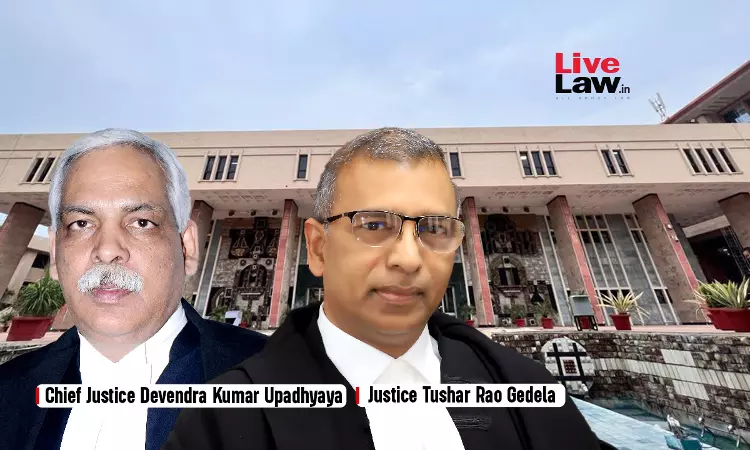- Home
- /
- High Courts
- /
- Delhi High Court
- /
- Eviction Order Has Serious...
Eviction Order Has Serious Consequences, Will Be Vitiated In Absence Of Show Cause Notice Under Senior Citizens Rules: Delhi High Court
Nupur Thapliyal
28 May 2025 9:30 AM IST
The Delhi High Court has ruled that an eviction order shall be vitiated in absence of a show cause notice under Rule 22(3)(1)(iv)(v) of the Delhi Maintenance and Welfare of Parents and Senior Citizens Rules, 2009. A division bench comprising Chief Justice DK Upadhyaya and Justice Tushar Rao Gedela said that eviction order has very serious consequences for the person who is occupying the...
The Delhi High Court has ruled that an eviction order shall be vitiated in absence of a show cause notice under Rule 22(3)(1)(iv)(v) of the Delhi Maintenance and Welfare of Parents and Senior Citizens Rules, 2009.
A division bench comprising Chief Justice DK Upadhyaya and Justice Tushar Rao Gedela said that eviction order has very serious consequences for the person who is occupying the property and thus, show cause notice is necessary.
The Court observed that the show cause notice has to clearly state the grounds of the proposed eviction order and such grounds of the proposed eviction order are to be based on the opinion of the District Magistrate that a party is not maintaining the senior citizen and yet is occupying the property.
“The person against whom eviction order is passed is suddenly, sometimes deprived of a dwelling space or a space where he may have been carrying on a business or any other activity for earning his/her livelihood. If the result of passing of an order of eviction bears such serious consequences which is directly related to ones survival, in our opinion holding that requirement of issuance of SCN as contemplated in Rule 22(3)(1)(iv)(v) of 2009 Rules is not mandatory, may have a cascading effect on the person who is proposed to be evicted,” the Court said.
The Bench made the observations while dealing with an appeal filed by a daughter in law challenging a single judge order disposing of her plea against the order passed by the passed by the Divisional Commissioner or Appellate Authority under the 2009 Rules.
The DM had allowed the petition filed by the mother in law and her late husband and had ordered eviction of the daughter in law and her husband. The latter then filed appeals before the Divisional Commissioner which were dismissed with a finding that the mother in law and her husband were victims of harassment and ill-treatment at the hands of their son and daughter-in-law. Vide the impugned order, the single judge did not interfere with the order of eviction passed by the DM.
It was the appellants' case that the order of eviction was vitiated and not sustainable on account of violation of mandatory requirements under Rule 22 (3)(1)(iv) & (v) of 2009 Rules.
It was submitted that the mother in law was not entitled to relief granted to her in relation to the subject property for the reason that the property was neither ancestral nor self-acquired but was owned by a company. It was also argued that the order of eviction against the appellants was not warranted.
It was submitted that under Section 17 (1) of the Domestic Violence Act, a married woman has a right to reside in a “shared household” irrespective of the fact as to whether she has any right, title or beneficial interest in the property.
Analyzing both the statutes in question, the Court said that the DV Act was enacted acknowledging that domestic violence is undoubtedly a human rights issue and a serious deterrent to development.
It said that Section 17 of DV Act contains a non-obstante clause which would mean that the provision shall prevail even if anything to the contrary is contained in any other law in force.
On Senior Citizens Act, the Court observed that Section 3 of the enactment contains a clause, according to which the provisions of the Act are to have effect notwithstanding anything inconsistent with such provisions contained in any other enactment or in any instrument having effect by virtue of any enactment other than the Senior Citizens Act. Thus, the provisions of the Senior Citizens Act by virtue of operation of Section 3 have the overriding effect, the Court said.
Furthermore, the Bench ruled that the opportunity as contemplated in Rule 22(3)(1)(iv)(v) of 2009 Rules to be provided to the person against whom order of eviction is proposed to be passed, cannot be said an empty formality, even if party concerned had participated in the proceedings before the DM till the stage of formation of opinion.
“In our opinion, non-communication of the ground on which eviction order is proposed to be made in itself causes a serious prejudice to the person against whom such an order is proposed as it deprives him of the opportunity to submit his explanation to the basis of such opinion formed by the DM,” it added.
The Court allowed the appeal and set aside the orders passed by the DM, Divisional Commissioner as well as the single judge.
“The proceedings of the petition/application made under Rule 22(3)(1) of Delhi Maintenance and Welfare of Parents and Senior Citizens Rules, 2009 are revived and restored to the file of the DM, who is directed to conclude the same and pass final orders within two months from today, in accordance with law and also taking into account the observations made hereinabove in this judgment,” the Court said.
Title: POOJA MEHTA & ORS v. GOVT. OF NCT OF DELHI & ORS
Citation: 2025 LiveLaw (Del) 629



